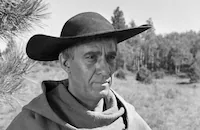Te quiero con locura
Cast & Crew
Rosita Moreno
Raúl Roulien
Enrique De Rosas
Juan Torena
Carlos Villarías
Romualdo Tirado
Film Details
Technical Specs

Synopsis
Betrothed to her bilious and neurasthenic cousin, Willy McRay, Norma Carter feigns insanity before her rich aunt and uncle in order to be committed to Dr. Nutts's sanitarium so that she can escape the union. Alberto Foster, another patient, pretends to be insane in order to avoid the wrath of his former mistress' husband, who has vowed to kill him as soon as Alberto is well enough to be a worthy opponent. Alberto meets Norma and invites her for drinks on his parked airplane, as alcohol is not permitted on the sanitarium grounds. Dr. Nutts learns of Alberto's flirtations and tells Norma that the clinic is filled with spies looking for people who are not really insane. Fearing that Alberto may be a spy, Norma behaves like a lunatic for him, but he is more charmed than ever by her madcap behavior and sneaks her out of the sanitarium for an evening on the town. The couple go to a cabaret in New York, and when Nutts discovers their absence, he pursues them with Harry, a sanitarium attendant and friend of Alberto. Hugo Rock, the jealous husband, appears at the club, and Alberto disguises himself with a false moustache. When the moustache falls off while he and Norma dance, Hugo screams and chases Alberto. Nutts arrives and joins the chase, and the couple are later found by police at Alberto's flat. At a court hearing, the greedy Dr. Nutts declares that Norma needs permanent care at his clinic and that Alberto is perfectly sane. The judge decides to have the couple observed by state "alienists" to determine their sanity or insanity. The alienists, who watch Alberto and Norma on a closed-circuit television monitor, report that they suffer from "incandescent love" and are quiet and harmless, but should be isolated. The cabaret owner, who wants restitution for his ruined business, Dr. Nutts, Norma's uncle, Harry and Hugo await the verdict, and when they begin to argue, the alienists accidentally change the channel and observe the group, whom they diagnose as furiously mad. The cabaret owner, Norma's uncle, and Hugo are then all committed. Later, Norma and Alberto, in a peaceful sanitarium-like setting, sing with their brood of lovely children about the sanity of insanity in a world filled with war and fascism.

Cast

Rosita Moreno
Raúl Roulien
Enrique De Rosas
Juan Torena
Carlos Villarías
Romualdo Tirado
Lucio Villegas
Nenette Noriega

Martín Garralaga
Vernon Steele
Emilia Leovalli
Manuel Peluffo
Enrique Acosta
Ramón Muñoz
José López Rubio
Hermine Sterler
Rudolf Carl
Elena Durán
Mildred Harris
Bernice Mason
Crew
John J. Boland
Edward Kilenyi
José López Rubio
José López Rubio
José López Rubio
Joseph Macdonald
Paul Perez
Enrique De Rosas
Raúl Roulien
Troy Sanders
John Stone

Film Details
Technical Specs

Quotes
Trivia
Notes
The plot was based on a dialogue continuity in the Twentieth Century-Fox Produced Scripts Collection, and the onscreen credits were taken from a screen credit sheet in the Twentieth Century-Fox Records of the Legal Department, both of which are in the UCLA Arts-Special Collections Library. The working title of the film was Rest Cure. The title was translated in reviews variously as I Love You Madly and I'm Crazy About You. According to information in the legal records, Enrique García Velloso, in collaboration with Pedro Muñoz Seca, revamped his play six months after it was produced. The new version, entitled La cura, was not used by the writers of the film. Also, in the correspondence in the legal records, producer John Stone states that he and Louis F. Moore, the head of Fox's Spanish Department, developed the plot line. A Daily Variety news item notes that with this film, Fox was trying out John J. Boland, formerly an assistant director, as a director and that they planned to try out at least two other assistant directors as directors of Spanish language films.












